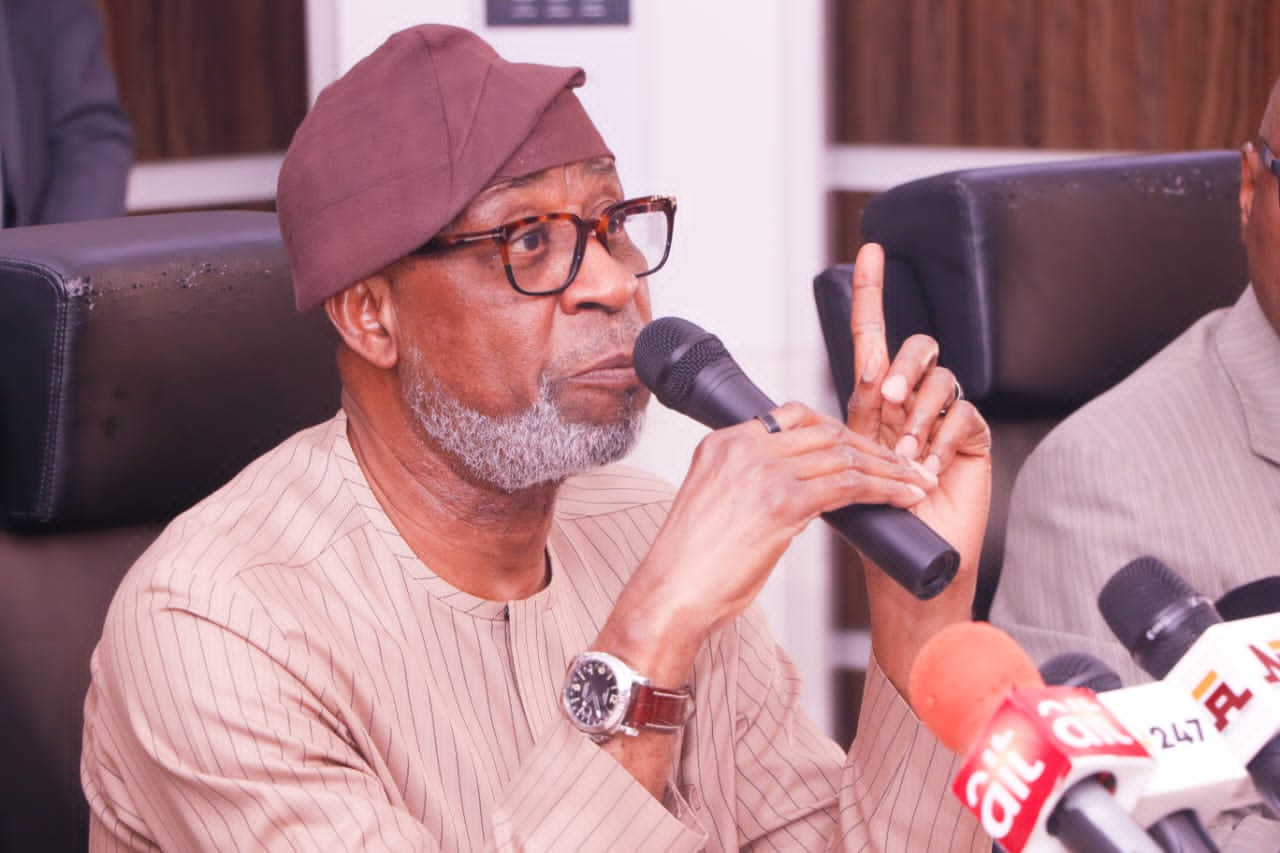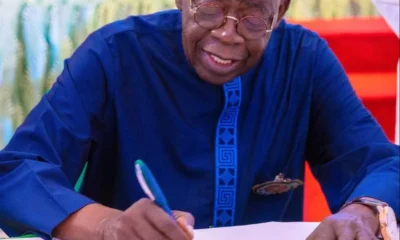News
Tinubu lists solutions to farmer-herder crisis, seeks national stakeholders meeting

National Leader of All Progressives Congress, Bola Tinubu, has finally spoken out on the farmer-herder crisis, which has resulted in bloody clashes in different parts of the country.
Tinubu, a former governor of Lagos, in a statement on Saturday, urged the Federal Government to convene a national security meeting comprising all stakeholders to resolve the crisis.
Even as he made a case for compensation for law-abiding farmers and herders who had been victims of the clashes, he said, “to help the herder and leave the farmer unattended is unfair and will only trigger a resentment that tracks already heated ethnic fault lines.”
Allegations that herders are responsible for killings and abductions in the South-West have generated tension in recent weeks.
For instance, Governor of Rotimi Akeredolu of Ondo State in January ordered herders to leave the state’s forest reserves. A youth leader, Sunday Igboho had also asked herders to vacate Ibarapa Local Government Area of Oyo State, accusing them of being behind many bloody attacks in the area.
President Muhammadu Buhari ordered security operatives to “go harder” on criminals and shoot anyone who possesses an AK-47 rifle illegally.
Tinubu said, “I recommend the Federal Government (should) convene a meeting of state governors, senior security officials, herder and farmer representatives, along with traditional rulers and religious leaders. The purpose of this meeting would be to hammer out a set of working principles to resolve the crisis.
“After this meeting, governors of each state should convene follow-up meetings in their states to refine and add flesh to the universal principles by adjusting them to the particular circumstances of their states.”
He stressed that farmers and herders should be supported by improving their method of operations.
He said law enforcement agents were also required in rural communities, adding that both federal and state governments “need to employ new technology and equipment to enhance the information gathering/surveillance and response capabilities of law enforcement”.
In addition, Tinubu said, “Both innocent and law-abiding farmer and herder need to be recompensed for the losses they have suffered. Both need further assistance to break the current cycle of violence and poverty.”
He urged all Nigerians to be united, embrace peace through dialogue and violence.
Tinubu’s full statement
The herder-farmer dispute has taken on acute and violent dimensions. It has cost too many innocent lives while destroying the property and livelihoods of many others. It has also aggravated ethnic sentiment and political tension. Despite the efforts of some of those in positions of high responsibility and public trust, the crisis has not significantly abated. Sadly, others who should know better have incited matters by tossing about hate-tainted statements that fall dangerously short of the leadership these people claim to provide. We all must get hold of our better selves to treat this matter with the sobriety it requires.
Because of the violence that has ensued and the fretful consequences of such violence if left unabated, we must move in unison but decisively to end the spiral of death and destruction. Only when the violence and the illogic of it are halted can logic and reason prevail. Until the violence is rolled back, we cannot resolve the deep problems that underlie this conflict. We will neither be able to uplift the farmer from his impoverished toil nor move the herder toward the historic transformation which he must make.
Yet, as vital as security is to the resolution of this matter, we must realize security measures alone will not suffice. Enhanced security may be the necessary first step, but it cannot be the only step. Nor do we resolve this by hitching ourselves to emotional, one-dimensional answers. More to the point, those who cast this as exclusively a matter of ethnic confrontation are mistaken. This is no time for reckless chauvinism of any kind, on either side of this dispute. This matter is not ethnic in factual origin or actual causation although in the minds and hearts of too many it has become ethnic in recrimination and impulsive action.
There have been sporadic disputes in the past but this one is more severe. The reasons for the greater violence of this current dispute are myriad. Economic hardship and its resultant dislocation, proliferation of weapons, generalized increase in criminality, and weakening of social institutions all play a role. Desertification, increased severity and length of the dry season, diminution of water resources, impairment of land fertility and population growth also contribute in no small measure. Thus, any durable solution must get at most, if not all, of these issues.
Farmers have a right to farm their land unmolested. Herders have a right to raise their livestock without undue interference. However, when conflict between these groups arises to such an extent, we must set forth clear principles and policies to remove the tension, in order to allow both to proceed toward their stated goals and to live in harmony and according to their respective rights. Just as I cannot go into your house and take your shirt because I do not have one of like colour, no one can destroy the crops of a farmer or seize the cattle of a herder simply because such destruction sates their anger or their selfish, short-term interests. If such a condition were to hold, then all would turn into chaos; all would be in jeopardy of being lost. To destroy the crops or seize the property of the innocent farmer or herder is nothing if not an act of criminality.
Here, I must state two fundamental realities. One has been previously mentioned by me and others as part of the solution. The other reality is hardly discussed.
First, the situation of the herder is becoming untenable. Their nomadic ways fall increasingly in conflict with the dictates of modern society. This way of life is centuries old and steeped in tradition. We can never condone or accept violence as a valid response to any hardship. However, we all must recognize and understand the sense of dislocation caused by the sudden passing of such a longstanding social institution.
I mention their dislocation not to excuse violence and other excesses. I raise it to underscore that we must realize the true complexity of this crisis. What is happening has been terrible, but it is not due to any intrinsic evil in either the herder or the farmer. The calamity now being faced is borne of situational exigencies. It is but the tragic outcome when often desperate, alienated people are left too long unattended and when their understanding of the modern socio-economic and environmental forces affecting the very terms of their existence is incomplete. An ethnically fuelled response will be to vociferously defend the nomadic way believing this tack will somehow protect the herder and cast the speaker as an ethnic champion. However, careless words cannot shield the herder from relentless reality. Such talk will only delude him into believing that he can somehow escape the inevitable. We do both herder and farmer grave injustice by allowing the herder to continue as he is – fighting a losing battle against modernity and climate change. In that fight, desperation causes him to flail and fight the farmer, who too is a victim of these impersonal forces.
Second, to help the herder and leave the farmer unattended is unfair and will only trigger a resentment that tracks already heated ethnic fault lines. The times have also been perilous for the hardscrabble farmer. He needs help to survive and to be more productive in ways that increases national food security. Farm productivity and incomes must be enhanced. Soil enrichment, better irrigation and water retention as well as provision of better rural roads, equipment and access to modern machinery are required to lift him above bare subsistence.
Both innocent and law-abiding farmer and herder need to be recompensed for the losses they have suffered. Both need further assistance to break the current cycle of violence and poverty. In short, the continued progressive reform of many of our rural socio-economic relationships is called for.
Based on these strategic observations, I recommend the federal government convene a meeting of state governors, senior security officials, herder and farmer representatives, along with traditional rulers and religious leaders. The purpose of this meeting would be to hammer out a set of working principles to resolve the crisis.
After this meeting, governors of each state should convene follow-up meetings in their states to refine and add flesh to the universal principles by adjusting them to the particular circumstances of their states. In addition to religious and traditional leaders and local farmer and herder representatives, these meetings shall include the state’s best security minds along with experts in agriculture (livestock and farming), land use and water management to draw specific plans for their states.
To accomplish this goal, wise policy must include the following elements:
- Maintain reasonable and effective law enforcement presence in affected areas. The proposed reform of the Nigerian law enforcement apparatus towards state and community policing can help in this regard. The legislative and administrative measures required to make this a reality should be expedited. In addition to alleviating the present farmer-herder crisis, this reform will also bolster efforts against the banditry, kidnapping and robbery plaguing communities across the country. Governments need to employ new technology and equipment to enhance the information gathering/surveillance and response capabilities of law enforcement.
- Help the herders’ transition to more sedentary but more profitable methods of cattle-rearing. Unoccupied public land can be fenced into grazing areas or ranches and leased to herders on a very low-cost, nominal basis. The leasing is not intended to penalize herders. Rather, the nominal fee is intended to ensure the herders are invested in the project and incentivized (by reason of their investment) to use the land provided. This aspect will also mitigate any resentment over herders being given land for free. Government, in turn, being a responsible lessor, must help with supplemental feed and water in these areas. This will enable herders to better maintain and care for their livestock thus enhancing their incomes. Herders can augment income by becoming suppliers to the leather goods industry. Additionally, herders can also develop a more symbiotic relationship with farmers by, for example, trading animal compost to the farmer in exchange for animal feed.
- Assist farmers increase productivity by supporting or providing subvention for their acquisition of fertilizer, equipment and machinery and, also, by establishing commodity boards to guarantee minimum prices for important crops. In the medium to long term, resources must be dedicated to establishing better irrigation and water catchment systems to further improve farm productivity and mitigate the dire impact of flood and drought cycles brought about by extreme climatic conditions.
- Establish a permanent panel in each state as a forum for farmers, herders, security officials and senior state officials to discuss their concerns, mitigate contention and identify trouble and douse it before it erupts.
We are a populous nation of diverse ethnic groups. We are a people of potential richness, yet to escape present poverty. We have resources but not wealth. Often, our words speak of hope and fear in the same breath. While we all hope and strive for the best, many fear that there is not enough of what is needed to go around and that they will be left out. In such a situation, harsh competition and contest are fated to occur. In the unfolding of this social dynamic, one group of actors has been pitted against another over dwindling water and fertile ground. The confrontation has resulted in the needless loss of life and destruction of property. If left to itself, this situation may spread and threaten the progress of the nation. It could call into proximate question the utility of the social compact that holds government and governed in positive bond, one to the other. We have a decision to make. Do we attempt the hard things that decency requires of us to right the situation? Or do we allow ourselves to be slave to short term motives that appeal to base instinct that run afoul of the democratic principles upon which this republic is founded and for which so many have already sacrificed so much? In the question itself, lies the answer.
SIGNED
Asiwaju Bola Tinubu.
March 13, 2021.
News
American Woman, 64, Alleges Embassy Mocked 27-Year-Old Fiancé Before Visa Denial

American Woman, 64, Alleges Embassy Mocked 27-Year-Old Fiancé Before Visa Denial
A 64-year-old American woman has claimed that officials at the U.S. Embassy in Lagos, Nigeria mocked her relationship with her 27-year-old Nigerian fiancé before denying his K-1 fiancé visa, leaving her emotionally distressed. The woman, who identified herself as Deborah, shared her experience during a live call with U.S. immigration attorney Jim Hacking, highlighting the challenges and perceived bias in the visa process.
Deborah explained that her fiancé attended a formal interview at the embassy but was issued a 221(g) refusal form, a common administrative measure indicating that further processing or verification is required before a visa can be granted. The notice stated that the applicant “does not meet the qualifications for the visa class.” Hacking told Deborah that 221(g) refusals often occur when consular officers have unresolved questions about the authenticity of a relationship, especially in cases involving significant age differences or unusual circumstances.
According to Deborah, the interview proceeded normally until the consular officer asked about the couple’s age difference. When informed that she was 64 and her fiancé 27, she alleges the officer reacted with surprise, repeatedly referenced her age, and appeared to discuss the relationship with a colleague outside the room. She described seeing both officers laughing in the hallway before returning and issuing the visa refusal.
READ ALSO:
- CBN Policies, Foreign Inflows Drive Naira to Two-Year Peak
- Edo Governor Okpebholo Names Mercy Johnson-Okojie Special Adviser
- Many Feared Dead as Suspected Lakurawa Militants Attack Kebbi Communities
Deborah said her fiancé presented about 20 documents, including photographs and chat records, to prove the legitimacy of their nearly two-year-long relationship. However, she claimed the consular officer dismissed the evidence as unnecessary at that stage.
Hacking advised Deborah that under such circumstances, the couple might consider marrying first and applying for a spousal visa, rather than a fiancé visa. He explained that even then, the process could take up to two years, a timeline that left Deborah visibly distressed during the live call.
Visa denials under Section 221(g) of the U.S. Immigration and Nationality Act are not uncommon and typically signal the need for additional documentation or administrative review rather than permanent ineligibility. Recent U.S. visa policies for Nigerians have tightened, including additional social-media disclosure requirements, reflecting broader efforts to combat fraud and ensure compliance with immigration rules.
Deborah described the denial as a “devastating blow” to a relationship she and her fiancé have nurtured for years. Despite prior visits to Nigeria, she said she had been hoping to spend more time with her fiancé in the U.S., a plan now complicated by procedural delays and bureaucratic hurdles.
American Woman, 64, Alleges Embassy Mocked 27-Year-Old Fiancé Before Visa Denial
News
FG Seals Plateau Mine After 37 Killed in Toxic Gas Tragedy

FG Seals Plateau Mine After 37 Killed in Toxic Gas Tragedy
The Federal Government has ordered the immediate closure of a mining site in Zuraq, Wase Local Government Area of Plateau State, following the death of 37 miners in a suspected toxic gas exposure.
Minister of Solid Minerals Development, Dr. Dele Alake, directed that the site be sealed to prevent further casualties and pave the way for a comprehensive investigation into the tragedy.
According to local authorities, the victims were exposed to poisonous gaseous emissions in the early hours of Tuesday while working in an underground pit. At least 25 other miners are currently receiving treatment in hospital.
In a statement issued in Abuja by his Special Assistant on Media, Segun Tomori, the minister disclosed that the affected site falls under Mining Licence 11810, operated by Solid Unit Nigeria Limited and owned by Abdullahi Dan-China.
READ ALSO:
- Troops Kill Five Kidnappers, Rescue Abducted Woman in Plateau
- Sowore Condemns Electoral Act 2026 as Threat to Nigeria’s Democracy
- DSS Takes El-Rufai into Custody After Two Nights at EFCC Headquarters
Alake said a high-level investigative team led by the ministry’s Permanent Secretary, Yusuf Yabo, has been deployed to the area to determine both the immediate and remote causes of the disaster and recommend appropriate sanctions. The team comprises mining engineers, environmental compliance officers and experts in artisanal mining operations.
Preliminary findings indicate that the licensed operator allegedly ceded the pit to members of the host community following agitation for economic empowerment. The area, reportedly an abandoned lead site, contained stored minerals capable of emitting sulphuric oxide — a hazardous substance.
Unaware of the danger, villagers engaged in mining activities and were exposed to the toxic fumes.
The minister described the incident as a tragic loss of innocent Nigerians striving to make a living and extended condolences to Plateau State Governor Caleb Mutfwang and families of the victims.
He assured that further updates would be provided as investigations progress, stressing the government’s commitment to enforcing safety and environmental standards in the mining sector.
FG Seals Plateau Mine After 37 Killed in Toxic Gas Tragedy
News
Tinubu Ends NNPCL Oil Revenue Deductions, Orders Full FAAC Remittance

Tinubu Ends NNPCL Oil Revenue Deductions, Orders Full FAAC Remittance
President Bola Ahmed Tinubu has signed a sweeping executive order mandating the direct remittance of all oil and gas revenues into the Federation Account Allocation Committee (Federation Account Allocation Committee), in what is regarded as one of the most significant fiscal reforms since the enactment of the Petroleum Industry Act (PIA).
The directive, announced by presidential spokesperson Bayo Onanuga, requires that all proceeds from royalty oil, tax oil, profit oil, and profit gas be paid in full into the federation account without deductions, before statutory distribution to the federal, state, and local governments.
A central element of the order strips Nigerian National Petroleum Company Limited (NNPCL) of its long-standing 30 per cent management fee on profit oil and profit gas, a deduction that has repeatedly drawn criticism for significantly reducing funds available for sharing among the three tiers of government. The presidency said the practice undermined constitutional revenue entitlements and weakened public finances.
In addition, the president directed that the 30 per cent Frontier Exploration Fund created under the PIA will no longer be retained or managed by NNPCL. Instead, all funds previously set aside under the arrangement will now flow directly into the federation account for FAAC distribution, altering the financing structure for frontier basin exploration activities.
READ ALSO:
- Lagos DSVA Confirms Mirabel Assault Happened in Ogun, Transfers Case
- Arsenal Blow Two-Goal Lead as Bottom Club Wolves Hold Gunners to 2–2 Draw
- Two Killed, Five Injured as Violence Erupts at APC Ward Congress in Ondo
The executive order also affects the handling of gas flare penalties. Payments into the Midstream and Downstream Gas Infrastructure Fund have been suspended, with all proceeds from gas flaring penalties now to be paid directly into the federation account. Officials said existing environmental remediation frameworks already cover such obligations, making the additional fund unnecessary.
According to the presidency, the reforms are aimed at blocking overlapping deductions, including management fees and profit retentions, which collectively divert more than two-thirds of potential oil and gas revenues before they reach FAAC. President Tinubu warned that shrinking net oil revenues pose serious risks to national budgeting, debt sustainability, and overall economic stability.
The president emphasised that the new framework will reposition NNPCL strictly as a commercially driven national oil company, removing quasi-fiscal responsibilities while strengthening transparency, accountability, and oversight in Nigeria’s oil and gas revenue management.
To ensure effective implementation, Tinubu approved the establishment of an inter-ministerial committee comprising senior officials from the economic management team, justice sector, and relevant regulatory agencies. The committee is expected to coordinate legal, financial, and operational steps required for immediate compliance.
The president also signalled plans for a broader review of the Petroleum Industry Act, indicating that further amendments may be pursued to address structural and fiscal concerns raised by stakeholders, particularly state governments.
With oil and gas revenues remaining central to Nigeria’s fiscal health, the executive order represents a decisive move to tighten revenue flows, strengthen FAAC allocations, and reinforce fiscal federalism across the country.
Tinubu Ends NNPCL Oil Revenue Deductions, Orders Full FAAC Remittance
-

 News3 days ago
News3 days agoSaudi Arabia Confirms Sighting of Ramadan Crescent, Fasting Begins Wednesday
-

 metro3 days ago
metro3 days agoLagos Woman Shares Ordeal After Alleged Rape, Sparks Nationwide Outcry
-

 News2 days ago
News2 days agoRamadan Begins in Nigeria as Sultan Confirms Crescent Sighting
-

 metro2 days ago
metro2 days agoSeven Killed in Horrific Crash at Ota Toll Gate
-

 International18 hours ago
International18 hours agoCanada Opens New Express Entry Draw for Nigerian Workers, Others
-

 metro3 days ago
metro3 days agoDeadlock at National Assembly as House Snubs Electoral Act Bill Meeting on E-Transmission Clause
-

 News2 days ago
News2 days agoKorope Drivers Shut Down Lekki–Epe Expressway Over Lagos Ban (Video)
-

 Health2 days ago
Health2 days agoRamadan Health Tips: Six Ways to Stay Hydrated While Fasting















